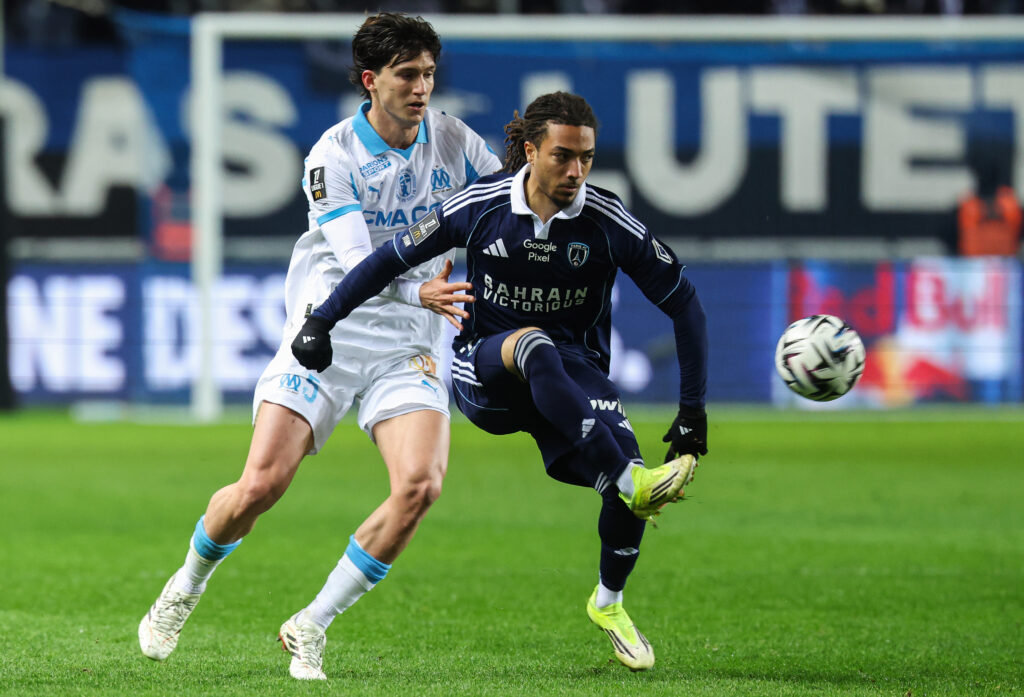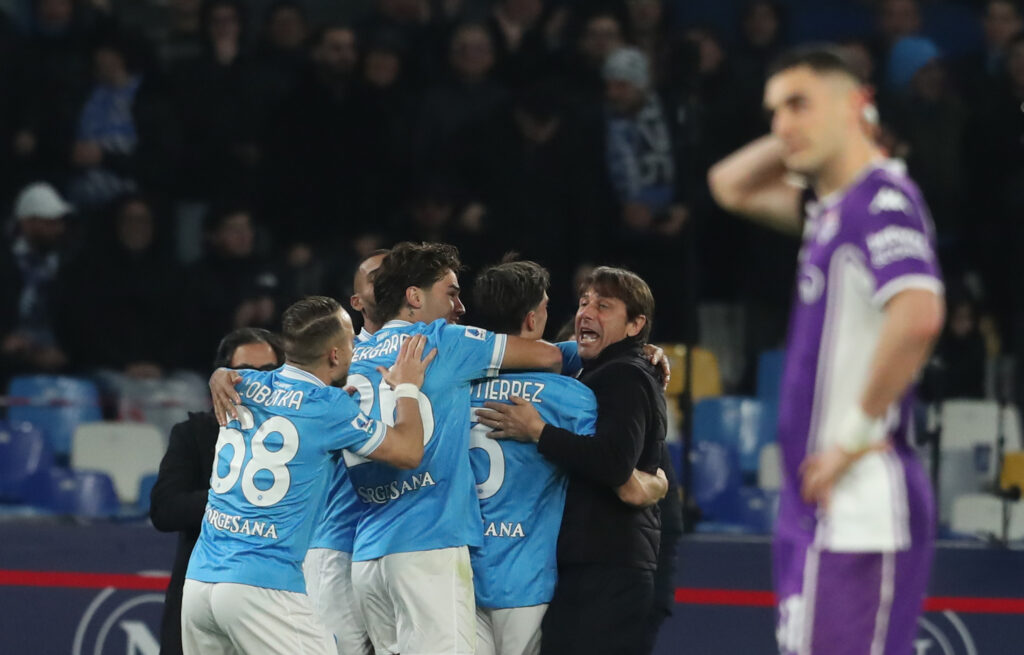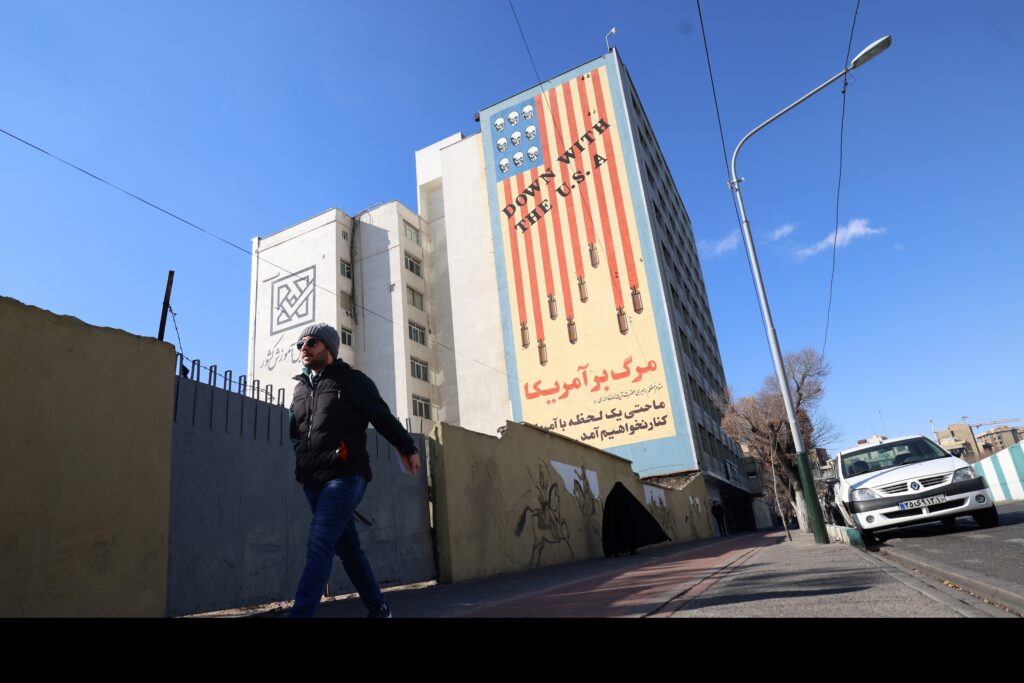Ligue 1: Marseille, le cauchemar continue
Après le désastre de Bruges, l’Olympique de Marseille a gaspillé deux buts d’avance au Paris FC (2-2) et n’est pas sorti de la crise, samedi lors de la 20e journée de Ligue 1.Encore une désillusion dans les dernières secondes pour l’OM. Corrigé en Belgique (3-0), éliminé de la Ligue des champions par un ultime but du gardien de Benfica, secoué par les atermoiements autour de l’avenir de son entraîneur Roberto De Zerbi, le club phocéen a encore souffert.Alors qu’il se dirigeait vers une victoire qui lui aurait mis du baume sur ses plaies, l’OM a concédé un penalty dans les dernières minutes pour une sortie au poings ratée de Geronimo Rulli, qui a boxé Marshall Munetsi.Pour plus d’amertume encore, c’est un Marseillais de naissance, Ilan Kebbal, au départ de l’action, qui a transformé le penalty (90e+4).Déjà l’OM avait laissé le PFC revenir dans le match par une tête de Jonathan Ikoné (82e), servi par Mamadou Mbow.Tout le bénéfice d’un bon début de match était gâché, et dans cette saison de montagnes russes, l’équipe a concédé un nouveau but dans les dernières secondes, loin d’être le premier (Sporting, Atalanta, PSG au Trophée des champions…).- “Ne vous inquiétez pas pour moi” -Après l’énorme désillusion de mercredi, l’OM recule à sept longueurs de Lens, leader qu’il avait pourtant largement dominé (3-1) une semaine plus tôt dans cette saison marquée par une irrégularité folle.Marseille devra, pour éteindre le feu de la crise qui couve, battre mardi Rennes en 8e de finale de la Coupe de France, sa meilleure chance de remporter un premier trophée depuis 2012.”Ne vous inquiétez pas pour moi, a assuré Roberto De Zerbi. Je suis prêt à partir à la guerre demain, après-demain, je viens de tout en bas de l’échelle, je suis habitué à combattre tout le temps.”Pourtant cette fois le plan de l’entraîneur italien semblait fonctionner, face à un PFC longtemps inoffensif.Mason Greenwood, à côté de son sujet comme tout le monde mercredi, a vite obtenu et transformé un penalty (18e s.p.), puis l’Anglais s’est mué en passeur pour offrir le 2-0 à Pierre-Emerick Aubameyang (53e), dans une ambiance très marseillaise.- “Aux armes!” -Un petit “Aux armes!”, l’air fétiche des Olympiens, a même salué, à deux choeurs, le but du K.-O. d’Aumbame entre les supporters marseillais de la populaire Eiffel et ceux de la présidentielle.Les ultras marseillais étaient interdits de déplacement, mais de nombreux fans vivant à Paris sont venus au match.Jean-Bouin s’est vengé en chambrant à son tour les Marseillais à 2-2.Les Phocéens auraient pu se mettre à l’abri plus tôt, quand une tête de Leonardo Balerdi a trouvé le poteau (74e).Pour le PFC, ce nul a des airs de victoire. Comme contre Lyon (3-3), qui menait 3-0, les joueurs de Stéphane Gilli ont réussi à tout renverser.Ils restent toutefois coincés à deux succès à domicile seulement depuis leur retour en L1, et sont 13e, en attendant les matches de leurs poursuivants.Mais ils ont fait vibrer leurs supporters et peuvent espérer que l’arrivée prochaine du buteur Ciro Immobile, qui devrait être officialisée dimanche après sa visite médicale, va leur faire du bien.Seul leur capitaine Maxime Lopez n’a pas pleinement profité de la victoire contre son club formateur. Le capitaine a été sorti à la mi-temps. Il était gêné par une douleur à une cuisse depuis quelques temps, mais aussi très nerveux sur la pelouse, pour ce match important pour lui.Averti pour une contestation (43e), il n’est pas passé loin du second jaune et de l’exclusion une minute plus tard pour une semelle sur Paixao.
Italie: Naples reprend des couleurs
Trois jours après son élimination en Ligue des champions, Naples a soigné son coup de blues en battant la Fiorentina 2 à 1 samedi lors de la 23e journée du Championnat d’Italie.Battu à domicile par Chelsea mercredi (3-2), le Napoli, qui restait sur une lourde défaite en Serie A sur le terrain de la Juventus Turin (3-0), a renoué avec la victoire grâce à des buts d’Antonio Vergara (11e) et de Miguel Gutierrez (49e).L’équipe d’Antonio Conte a tremblé quand la Fiorentina a rapidement réduit le score (51e), mais elle a tenu le choc et conservé son avantage.Grâce à ce succès, seulement le troisième de l’année 2026 en sept matches de championnat, le champion en titre est remonté, au moins provisoirement, sur le podium (3e, 46 pts), en débordant l’AS Rome (4e, 43 pts), opposé lundi à l’Udinese.Il est aussi revenu sur les talons de l’AC Milan (2e, 47 pts) qui attendra mardi à Bologne pour disputer son match de la 23e journée, mais accuse six longueurs de retard sur le leader, l’Inter, en déplacement dimanche à Crémone.Cette victoire a aussi un coût pour une équipe accablée par les blessures de longue durée (De Bruyne, Aguissa, Lukaku): son capitaine Giovanni Di Lorenzo est sorti sur une civière après s’être tordu un genou en tentant de reprendre un corner de la tête (29e).Conte ne s’est guère montré rassurant pour l’international italien: “C’est une blessure grave, le ligament croisé”, a-t-il regretté sur la plateforme DAZN. “On tue ces mecs, on tue le football, le football se mord la queue et va dans une mauvaise direction (…) Avec 60-70 matches par saison, c’est un suicide”, a accusé l’ancien sélectionneur italien, très remonté.”On ne baisse pas le bras, on a encore la Coupe d’Italie et l’envie de se qualifier pour l’Europe”, a déclaré Conte à propos des ambitions de son équipe pour la seconde partie de la saison.La Fiorentina, elle, reste bloquée à la 18e place (17 pts), à une longueur de Lecce qui occupe la 17e place, synonyme de maintien.
L’Iran parle de “progrès” en vue de négociations avec Washington
Un haut dirigeant iranien a fait état samedi de “progrès” en vue de “négociations” avec Washington, nouveau rebondissement dans un contexte tendu alimenté depuis plusieurs jours par les déclarations belliqueuses de part et d’autre.”Contrairement à la propagande de guerre artificiellement créée par les médias, la mise en place d’un cadre de négociation progresse”, a écrit en persan sur X Ali Larijani, secrétaire de la plus haute instance de sécurité en Iran, qui avait été reçu la veille à Moscou par le président russe Vladimir Poutine.Cette déclaration intervient alors que le président américain Donald Trump avait affirmé vendredi que l’Iran voulait “conclure un accord” sur le nucléaire, ajoutant qu’il avait fixé à Téhéran un ultimatum sans donner plus de détails.Elle fait aussi suite à d’autres propos, nettement plus offensifs, tenus par le chef de l’armée iranienne Amir Hatami, selon lequel les forces armées iraniennes sont “en état d’alerte maximale” face à une éventuelle attaque américaine.Depuis la vague de contestation réprimée début janvier dans le sang par le pouvoir iranien, Donald Trump a multiplié les avertissements tout en soufflant le chaud et le froid, et a déployé une dizaine de navires dans le Golfe, dont le porte-avions Abraham Lincoln.Ces menaces entretiennent un climat de fébrilité en Iran. Une explosion survenue samedi dans un immeuble résidentiel de Bandar Abbas, un port du sud de l’Iran sur le Golfe, est restée inexpliquée plusieurs heures avant que les pompiers annoncent qu’il s’agissait d’une fuite de gaz.Des incidents distincts ont été rapportés ailleurs dans le pays mais les médias ont rapidement écarté tout lien avec une attaque américaine.Une rumeur affirmant que le chef des forces navales des Gardiens de la Révolution avait été assassiné a par ailleurs largement circulé sur les réseaux sociaux, a rapporté l’agence Tasnim, l’attribuant à “une opération psychologique” menée par des “courants anti-Iran”.- Exercice naval -Tout en se disant ouvert au dialogue, l’Iran, “doigt sur la gâchette”, a déjà averti que de “nombreuses” bases américaines dans la région se trouvaient à portée de missiles iraniens. Il a également menacé de bloquer le détroit d’Ormuz, point de transit clé pour les approvisionnements énergétiques mondiaux.Les Gardiens de la Révolution vont y mener à partir de dimanche “un exercice naval de tir réel de deux jours”, a indiqué le Commandement militaire américain pour le Moyen-Orient (Centcom), mettant en garde contre “tout comportement dangereux” à proximité des forces américaines.Pour autant, le chef de la diplomatie, Abbas Araghchi, n’avait pas exclu vendredi de participer à des discussions si elles étaient “justes et équitables”, répétant que son pays n’avait “jamais cherché à se doter de l’arme nucléaire”.Il a cependant ajouté que les capacités de défense et les missiles de son pays “ne feraient jamais l’objet de négociations”.- Khamenei prie à Téhéran -Les pays du Golfe appellent à la retenue, tout comme la Turquie voisine. A la frontière, une Iranienne qui vient de quitter son pays se prend à espérer une “intervention extérieure”. “Ils en ont tués tellement… Nous prions pour que l’Amérique nous attaque, voilà où nous en sommes”, lâche cette quinquagénaire, interrogée par l’AFP.La pression est aussi montée ces derniers jours avec l’inscription par l’UE sur la liste des “organisations terroristes” des Gardiens de la Révolution, l’armée idéologique de la République islamique accusée d’avoir orchestré la répression des manifestations. Une décision qualifiée d'”insensée” par Téhéran.Alors que des analystes n’excluent pas le fait que les Etats-Unis veuillent éliminer les plus hauts dirigeants iraniens, le guide suprême, l’ayatollah Ali Khamenei, a visité samedi le mausolée de Rouhollah Khomeini, le fondateur de la République islamique, dans le sud de Téhéran.Dans des images publiées sur son site officiel, M. Khamenei, qui ne s’était pas montré en public depuis le 17 janvier, apparaît en train de prier.Sorti affaibli de la guerre de juin 2025, le pouvoir iranien a étouffé les récentes manifestations, initialement contre le coût de la vie, mais qui se sont transformées en défi au pouvoir.Plus de 6.500 personnes, dont 6.170 manifestants et 124 enfants, ont été tuées en Iran, d’après un bilan actualisé de l’ONG Human Rights Activists News Agency (HRANA), dont le siège est aux Etats-Unis et qui enquête sur plus de 17.000 décès potentiels supplémentaires. Les autorités iraniennes reconnaissent que des milliers de personnes ont été tuées lors des manifestations, mais affirment que la grande majorité étaient des forces de sécurité ou passants tués par des “émeutiers”.



